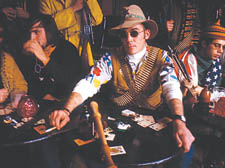|
|
 |
| |
Dr Gonzo: the man behind the myth
GONZO
Directed by Alex Gibney
Certificate 15
JOHNNY Depp called the Gonzo journalist Hunter S Thompson his hero – and so when the chance came to play a pivotal role in a documentary celebrating the life of the rebel journalist, Depp didn’t need to think twice.
Gonzo, directed by Oscar-winning film-maker Alex Gibney, draws on previously unseen footage and work of the writer. Yet it fails to explore the reasons behind the journalist’s violent death. I have often wondered about his motivation for killing himself (he committed suicide, aged 67, in February, 2005).
In pictures before he died, he looked terribly worn and tired – a lifetime of heavy drinking and drug abuse had robbed him of his shine. Was it an attempt to have control over his terminal demise? Or was he bored, and wanted to end it all in a blaze of glory?
This is an important question for his fans – he is greatly missed, and never more so than during the presidential campaign this year. What would his razor-sharp pen have made of the McCain/Palin axis? His death robbed us of a brilliant political writer.
Yet he’d often spoken of killing himself before: in the introduction of his first collected works, The Great Shark Hunt, written in 1977, he considers throwing himself out of a window 28 storeys up when he signs off the piece. None of this is discussed in any detail.
Alex Gibney had access to Thompson’s archive of unpublished works – and despite failing to tackle this massive issue, Gibney has created a well-formed picture of a man who as a correspondent for Rolling Stone magazine invented “Gonzo” journalism, where the reporter became an integral part of the story.
Gibney told me: “Johnny Depp was the natural choice, and only too happy to be involved. Depp had inhabited his character when he had made Fear and Loathing, living with HST. He loved reading HST’s works – it brought his friend back from the dead.”
It was just as enjoyable for the director.
“I trawled through his papers and spoke to as many people who knew him as I could. I was naively enthusiastic – like a young school boy about to take his first hit of orange sunshine [LSD]. I had no idea what kind of ride I was letting myself in for.
“We had the run of the estate finding audiotapes, films, photographs, long-forgotten drawings and even 600 bars of Neutrogena soap from the Las Vegas trip.
“We spoke to his friends and enemies, watched Anita, his
widow, and Juan, Thompson’s son, fire his guns. We pursued Johnny Depp over four continents and marvelled at rare, unseen drawings from Hunter’s great collaborator, Ralph Steadman. But the most satisfying part of the journey was through the words of the man – thousands of letters, his many articles, books, and even unpublished manuscripts.”
Gibney said making the film revealed what gave Thompson an edge as a journalist.
“He personified what a political writer should be about. In the late 1960s and early 1970s, when he was at the height of his powers, the American people were going through a period where they were being suckered by people in power and HST helped restore the balance. He did not play by the rules. He was successful slaying sacred cows, speaking the truth by using his words and articles in a really funny way. He brought himself into the story and created a subversive character. It meant he was able to expose people he felt were simply lying. I tried to dig into the myth to find the man. He would hit people when they were off balance.”
Thompson’s violent articles nearly ruined the careers of some of the people in the film. Right-wing politician Pat Buchanan was a regular target, and his attacks on Democratic presidential nominee George McGovern helped derail his 1972 campaign – yet they still were happy to be involved.
“Pat Buchanan actually liked him,” says Gibney. “Although HST poured vitriol on him, and assassinated his character, Pat believes he was fair – he went after Republicans and Democrats alike. No one was safe.”
So what would Thompson have made of November’s Presidential election?
“Obama would be his George McGovern until things turned sour. He would have seen he was outside of the old boys’ club and that he represented hope. He would have had a ball with Palin. He’d be happy to join her shooting wolves from a helicopter with an automatic. He would have also pointed out the type of nutter that she is and the wild recklessness of her being chosen as a vice presidential candidate. He would have had a blast.” |
 |
|
 |
| |
|
 |
|

